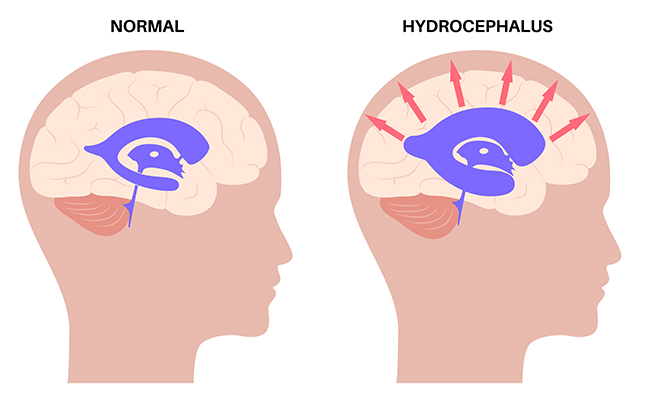Normal Pressure Hydrocephalus (NPH)

Normal pressure hydrocephalus (NPH) is a neurologic disorder that occurs when cerebrospinal fluid (CSF) builds up in your brain and disrupts normal functioning. This can manifest with a variety of symptoms but most commonly affects memory, ability to walk, and urination. The symptoms of NPH can look very similar to dementia, but NPH may be reversible in some individuals.
NPH is most common in individuals over 65 years old. NPH is relatively uncommon affecting about 0.2% of people between the ages of 70 and 80, and 6.9 % of people over 80.
What causes NPH?
NPH occurs when cerebrospinal fluid builds up and causes pressure on the brain. Having a small amount of CSF is normal and actually protects your brain and spinal cord. When an individual’s body doesn’t circulate or reabsorb CSF correctly, it can cause too much of this fluid to build up inside the skull. This fluid buildup can be gradual but can cause symptoms over time. If too much CSF accumulates it can compress the brain tissue and cause permanent damage.
What are the symptoms of NPH?
Normal pressure hydrocephalus is characterized by three main symptoms:
1. Gait Abnormalities
2. Urinary Incontinence
3. Memory Changes
These changes generally develop gradually and can worsen over a common time period of three to six months. About 80-95% of patients with NPH develop changes in ambulation. These changes can include trouble lifting your feet, steps becoming shorter, shuffling in quality or unsteady, freezing when walking of uncertainty with walking, and rotation of feet outwards when walking. Cognitive changes and urinary incontinence, or loss of bladder control are also commonly seen in this condition. Cognitive changes may include slowness in thought, forgetfulness, focus or concentration problems, or emotional changes.
How do we diagnose NPH?
A diagnosis of NPH can be difficult and it is recommended to see a neurologist who can offer a specialized examination and further diagnostic options including: MRI, lab tests, and spinal tap (lumbar puncture).
What are the treatment options for NPH?
NPH can be treatable. The most common and effective treatment option for NPH is a surgery to implant a device called a shunt. A shunt is made up of tubes that allow excess fluid to drain. Shunts can be programmed and adjusted to the individual. These procedures are done by skilled neurosurgeons trained in the area.
If you or a loved one are experiencing symptoms, please contact your primary care provider for a referral to our clinic. Need a primary care provider? Schedule online today or call (208) 367-4242. We are currently accepting new patients.
Our Location

Neurology
Saint Alphonsus Neurology Mulvaney
1072 N Liberty St
Ste 303
Boise, ID 83704
Phone: (208) 302-4200

